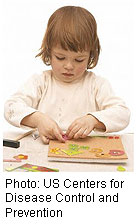
MONDAY, April 19 (HealthDay News) — Almost six out of 10 child-care centers in Wisconsin send home children who have minor illnesses — even though professional guidelines suggest otherwise, a new study finds.
Guidelines developed jointly by the American Academy of Pediatrics and the American Public Health Association (AAP/APHA) recommend that children with mild illnesses, even, in some cases, certain infectious illnesses like pink eye (conjunctivitis), can safely stay at their child-care center.
That’s because, “by the time you start showing symptoms, the cat’s already out of the bag,” explained study author Dr. Andrew Hashikawa, an instructor of pediatrics at the Medical College of Wisconsin. If a child has a cold, pink eye, a stomach illness or even a fungal infection like ringworm, he or she has likely been contagious for at least several days before the symptoms became evident, Hashikawa said.
So, keeping a child home at that point won’t help keep other children from getting sick, but it will place a burden a parent who has to miss work. Yet, 57 percent of day-care centers would choose to send home youngsters with just mild illnesses, the study found.
Results of the study are scheduled to be published in the May issue of Pediatrics, but will be released online on April 19.
More than two-thirds of American children who are under 5 are cared for at times by someone other than their parent, according to background information in the study. And, many of those children receive care at a child-care center.
The state of Wisconsin began endorsing the AAP/APHA guidelines more than 10 years ago, and the state routinely sends out educational materials to make child-care center directors aware of the guidelines.
Hashikawa and his colleagues posed five different scenarios to 305 child care center directors in Milwaukee, Wisconsin. The five different symptoms or illnesses included in the scenarios were a cold, fever, ringworm on the scalp, pink eye and a stomach illness (gastroenteritis).
In each of these cases, the child shouldn’t have been immediately excluded from day care. One exception, said Hashikawa, is if a child has diarrhea. When children have watery stools, they should be sent home, he said.
The AAP advises keeping a child with pink eye at home if there is discharge from the eye, however, even if he or she is taking antibiotic drops.
Almost two-thirds (62 percent) of the directors surveyed had never heard of the AAP/APHA guidelines, reported the study.
There researchers found variability between centers. Day care centers that had more than 10 percent of children receiving state-assisted tuition and those with a greater percentage of female heads of household were less likely to send kids home for minor illnesses, according to the study.
“This study highlights the need for ongoing training,” said Hashikawa. “I think child care directors need more support and ongoing education.”
Brian Crowe, executive director of the National Association of Child Care Providers, agreed. “Education is everything. If the directors of child care facilities and centers are well-educated and understand the recommended guidelines, then it’s fairly clear which children should stay and which should go home.”
Crowe said it’s helpful to have a good understanding of what your child’s day care center’s policies are ahead of time. And, when your child starts attending a day care, “you need to invest in that relationship, and be sure to communicate,” he advised. That way, if your child has a condition like allergies, your day care center probably won’t send him or her home at the first sign of a runny nose if no other symptoms are present.
Hashikawa said one of the easiest ways to figure out if your child has a mild illness is to check how your child is acting. If he or she is lethargic or needs a lot of attention because of the illness, then it’s probably best to keep your child home. But, if your child has a runny nose, and otherwise seems fine, then the guidelines suggest your child could be in day care.
The AAP also recommends keeping children at home if they have a fever, bloody stool, mouth sores with drooling, or frequent vomiting, or if they have untreated lice, scabies, or impetigo.
“The underlying guide is whether or not a child care center has to use too many resources taking care of one child. If that’s the case, that’s when they need to send the child home,” he said.
More information
Learn more about choosing child care and preventing illness in your children from the American Academy of Pediatrics.

